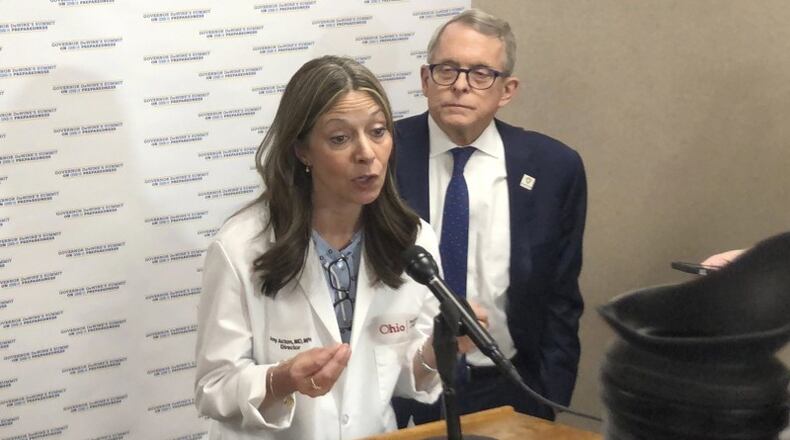“We do not have a whole lot of time,” DeWine said.
>> Coronavirus: Complete Coverage
New modeling from the Cleveland Clinic shows that Ohio may see as many as 10,000 new cases per day at the peak and Ohio may need to triple its hospital bed capacity.
“Everything we’re doing is to build out capacity right now,” said Dr. Amy Acton, director of the Ohio Department of Health.
Ohio’s confirmed coronavirus cases climbed to 1,137, including 276 hospitalizations and 19 deaths, as the state heads into what is expected to be a steep increase in cases. The deaths in Ohio include four Miami County nursing-home residents, who are now confirmed to have died from COVID-19.
Even people who show symptoms won’t necessarily be tested for coronavirus. Between 40% and 70% of the population is expected to be infected over the course of a year. The disease could come in multiple waves.
Sarah Hackenbracht, president and CEO of Greater Dayton Area Hospital Association, said hospitals are working on capacity plans.
Local hospitals are looking at how to internally boost capacity, such as by converting rooms from singles to doubles, growing their ICU capabilities, and adding spaces in hospitals to have more bed space.
These hospitals are talking with other health-care providers that aren’t hospitals that they can turn to for extra bed space, she said. Finally, they have the ability to stand up a regional medical shelter.
Usually patients stay in hospitals for three days on average for routine matters such as childbirth or surgical recovery. Patients with COVID-19 who need hospital care are admitted for up to 20 days.
MORE: What coronavirus means for local seniors and services
Hospitals are working to expand capacity of intensive-care units, including converting operating rooms and emergency departments into ICU spaces, Acton said.
Hospitals are looking at renting floors of hotels or using vacant college dormitory rooms for non-COVID19 patients, Acton said. Hotel rooms may be used by health care workers who need to rest but don’t want to potentially expose family members.
In addition, they say at the projected peak, we need to go up 3x in our hospital capacity. We have a long way to go. This is the stark reality. The good news: the hospitals have all been planning for this. But now we are closing up the planning and moving toward the action. pic.twitter.com/Mj8GaYHF04
— Governor Mike DeWine (@GovMikeDeWine) March 27, 2020
As hospitals build ICU and bed capacity, steps are being taken to prepare more medical workers. A bill signed into law by Gov. Mike DeWine on Friday allows recent nursing school graduates to get temporary licenses so they can start work immediately.
MORE: Coronavirus: Several YMCA branches turned into emergency child care centers
Acton said surgeons and other doctors who are not doing elective procedures have volunteered to be redeployed to the COVID-19 frontline and efforts are under way to shift older health-care workers to handle telemedicine.
Absent a vaccine, researchers are looking at which anti-viral medications may effectively treat the disease and blood tests will be developed to determine who has had the virus and has developed immunity to it.
DeWine said the No. 1 concern among health care and emergency workers is the shortage of protective N95 masks. Columbus-based Battelle Memorial Institute is awaiting federal Food and Drug Administration approval for a new system of cleaning and re-using N95 masks.
Lt. Gov. Jon Husted said federal approval could come as early as Friday night. If approved, two machines capable of sanitizing 160,000 masks a day will be deployed in Ohio and other machines will be sent to New York, Seattle and Washington, D.C., Husted said.
“This is a great technology. We know it’s going to make a difference,” Acton said.
Though Ohio leaders haven’t issued an order about out-of-state travelers, anyone coming into Ohio should self-quarantine 14 days, DeWine said.
RELATED COVERAGE:
>> Coronavirus: Traffic drops, roads empty as virus keeps Ohioans home
>> Coronavirus: DeWine postpones State of the State address
>> Coronavirus: Real ID deadline extended after states close BMV offices

